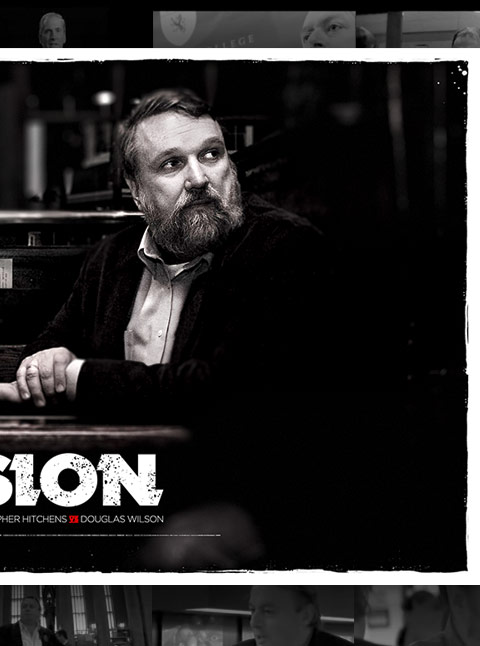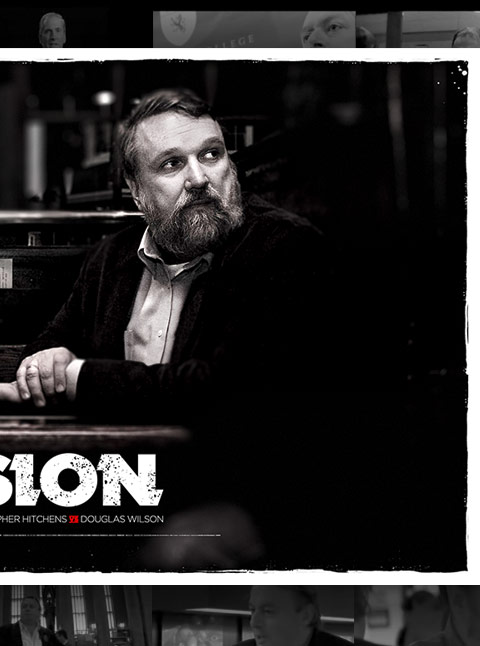Molly Worthen on Douglas Wilson
April 5th, 2009 The kind lady at the local Christian bookstore has been poised with my cell phone number in hand for a few days now, knowing my determination to somehow find an April issue of Christianity Today somewhere in San Diego. “Is there someone you know in this issue?” she asked. “Yes, there is.” Molly Worthen now has a seven page article on my old teacher, titled “The Controversialist.”
The kind lady at the local Christian bookstore has been poised with my cell phone number in hand for a few days now, knowing my determination to somehow find an April issue of Christianity Today somewhere in San Diego. “Is there someone you know in this issue?” she asked. “Yes, there is.” Molly Worthen now has a seven page article on my old teacher, titled “The Controversialist.”
I received the call Friday afternoon. A pleasant sense of accomplishment came over me once the magazine was physically in my hands. A trip to Borders Books and Barnes and Noble had already turned out dry; neither of the local stores still carry Christianity Today. Although, I did accidentally see the name ‘Christopher Hitchens’ while browsing the magazine stands. Hitchens has decided to write a letter to the president of the United States – no more arrogant than arguing with God I suppose. The same was true for the local libraries: no Christianity Today and plenty of Hitchens. The small local library here in Cardiff By The Sea has likely never carried Christianity Today. Yet, the last time I stopped in, someone had thrown the most recent issue of Vanity Fair on top of the displayed weekend newspaper.
I went down to the Seaside Market to get a 6 pack of Heineken after writing the rough draft of this entry and once again had the experience. I found the latest issue of Vanity Fair staring at me at the checkout stand. Heineken is more difficult to locate at a grocery store than Christopher Hitchens. And this was only out of four magazines: three magazines of hot women and one with half naked men wearing barrels. It was the barrels that grabbed my attention. Perhaps Hitchens is becoming, unknowingly, the Big Brother he despises – he is everywhere, and he lets us all know what he thinks we ought to think.
After this journey in search for April’s issue, there is little question in my mind why Worthen opens her piece with a paragraph extolling the accomplishments and status of, not Douglas Wilson, but my Big Brother Hitchens. In reality, I do not recall knowing of the man before the Kirk came up with her latest marketing idea. Once again, I owe a good deal to my teacher Douglas Wilson. Another four books by Hitchens are on their way.
Before getting to the obvious task at hand, I wish to first seek some patience from the reader. I keep saying that Pooh’s Think, Part 2, is not “about Douglas Wilson,” only to then continue writing about Douglas Wilson. And it will not end here. Not only is my analysis of Wilson’s debate (Canon Press) with Hitchens incomplete, I also have the two hour discussion between Hitchens and the four-and-a-half apologists at the Christian Book Expo to address – and boy was that something. And now here is Molly Worthen once again writing about my beloved Kirk: “Wilson is becoming someone who even those minding their own business in the noncontroversial ‘mainstream’ cannot afford to ignore.” If other scholars would stop writing articles about Wilson or giving Wilson the stage lights of ‘debate,’ I could get further along with my book and write posts on something else. As it is, I ask you to bear with me just a little bit longer.
But I am starting to wonder if my promise to say off topic was a bit premature. After all, if I was the only expert on the European Green Crab, would anyone object to my authoring a site dedicated to that species? I would think that my task would produce additional justification; the species of my expertise has been almost extinct the last 400 years.
____________
Molly Worthen is once again to be commended for her judicious reporting on the Kirk. Her first task, in 2006, was a piece for the New York Times Magazine, “Onward Christian Soldiers.” She touched briefly on Douglas Wilson, of all appearances a “lumber jack,” but that was not the focus of her thesis. The Christian soldiers were the students, fellows, and doctors of New St. Andrews College. In this latest, the topic just is Douglas Wilson, the controversialist. I recommend reading the article, and not just my response below. I will post a link to the article here as soon as one is available. Read the rest of this entry »

 In continuation of my analysis of the
In continuation of my analysis of the  My summary of the debate between Wilson and Hitchens (Canon Press) can be found
My summary of the debate between Wilson and Hitchens (Canon Press) can be found  Taking a fatalistic view that was at odds with his ostensibly cheery humanism, he used to say that “if you look in playgrounds, you see the little judge and the little burglar and the little murderer and the little banker.” He tried and failed to derive consolation from religion, and once had the following exchange with Cardinal Basil Hume: Hume pontificated to him that, were there to be no God, human life would be absurd. “Well, exactly” was Mortimer’s rejoinder. (
Taking a fatalistic view that was at odds with his ostensibly cheery humanism, he used to say that “if you look in playgrounds, you see the little judge and the little burglar and the little murderer and the little banker.” He tried and failed to derive consolation from religion, and once had the following exchange with Cardinal Basil Hume: Hume pontificated to him that, were there to be no God, human life would be absurd. “Well, exactly” was Mortimer’s rejoinder. ( My interest in this debate is two-fold. First, I believe this debate sheds further light on the work, life, and psychology of fundamentalism’s most intriguing American leader, Douglas Wilson, as well as the beautiful world he brought forth from the dust of the earth, which I like to call – as did Wilson not long ago –
My interest in this debate is two-fold. First, I believe this debate sheds further light on the work, life, and psychology of fundamentalism’s most intriguing American leader, Douglas Wilson, as well as the beautiful world he brought forth from the dust of the earth, which I like to call – as did Wilson not long ago – 
 “I
“I also web published at Christianity Today. As any good professing presuppositionalist would do, Wilson centers the debate on a neo-Van Tillian version of the moral argument. I plan to offer an analysis of this debate and in time get on to seeking some answers for the questions above. For now, I want to challenge Hitchens’ elegant claim that morality is simply “innate.”
also web published at Christianity Today. As any good professing presuppositionalist would do, Wilson centers the debate on a neo-Van Tillian version of the moral argument. I plan to offer an analysis of this debate and in time get on to seeking some answers for the questions above. For now, I want to challenge Hitchens’ elegant claim that morality is simply “innate.”